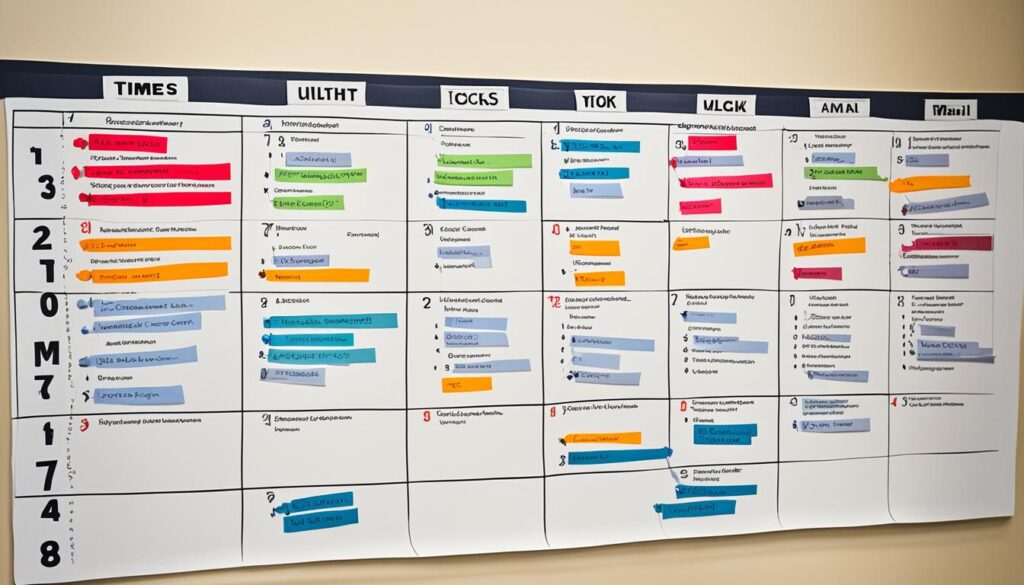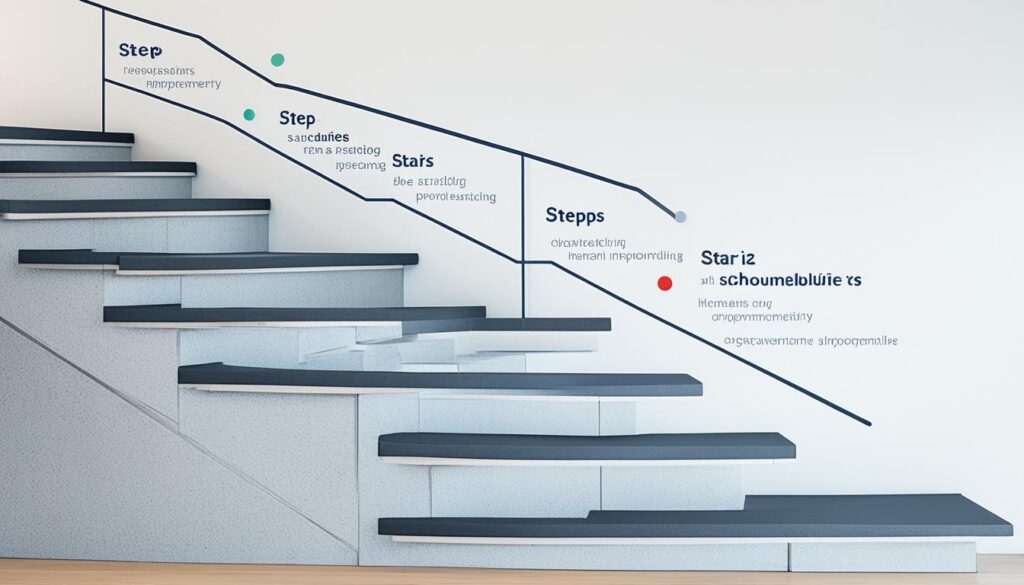The average worker spends around 30 hours per week on email-related tasks.1 This staggering amount highlights the critical need for effective time management strategies.
Highly productive individuals like Warren Buffett and Sheryl Sandberg have demonstrated that mastering time management can unlock your full potential and achieve your goals.2
Effective time management means using your time efficiently, being productive, and accomplishing your daily tasks as well as your larger life goals. It involves knowing the difference between being busy and being productive.
When you’re busy, your mind is preoccupied with your to-do list, skipping from one task to another without focus. When you’re productive, you have a plan and can laser-focus on your goals.
Time management skills include setting goals, focusing, organizing, prioritizing, communicating, and delegating.3
The first step toward improving your time management skills is realizing that it’s a mental game that anyone can master. It’s about your internal state, not external tools.
By incorporating proven time-management activities into your daily routine, you can unlock increased productivity, focus, and a greater sense of fulfillment in both your professional and personal life.
Key Takeaways
- Effective time management is a crucial skill that separates highly productive individuals from the rest.
- Time management involves knowing the difference between being busy and being productive.
- Time management skills include setting goals, focusing, organizing, prioritizing, communicating, and delegating.
- Mastering time management is a mental game that anyone can learn through proven activities.
- Incorporating time-management activities can lead to increased productivity, focus, and a greater sense of fulfillment.
Understanding Time Management
Time management skills allow you to use your time efficiently.4 You accomplish daily tasks and life goals. It distinguishes being busy from productive.4 When productive, you plan tasks with laser-focus.
Time management skills include setting goals, focusing, organizing, prioritizing, communicating, and delegating.
Importance of Time Management
Time management is crucial for personal and professional success. Effective skills provide benefits like:
Less stress and anxiety.
Better work-life balance.
Increased focus and productivity.
- More free time
- Simplified and easier task management
- Less distraction
- Greater energy and motivation
Benefits of Effective Time Management
Effective time management helps you work smarter, increasing productivity and profitability.
Key benefits include:
Reduced stress and anxiety.5
Improved work-life balance.5
Higher focus and productivity levels.5
More free time for personal interests.5
Simplified, streamlined task management.5
Fewer distractions, better time spent.5
Common Time Management Challenges
Poor planning is a major challenge. Failing to allocate enough time or underestimating tasks can overwhelm you. Without a clear plan, meeting deadlines gets difficult.
Lack of organization leads to prioritizing issues. Without structure, you may struggle to differentiate urgent from non-urgent tasks. This causes reactive decision-making and increased stress.
Feeling Overwhelmed
Heavy workloads or multiple responsibilities make many feel overwhelmed. Staying on top of deadlines becomes challenging. This leads to stress, anxiety, procrastination, and avoidance behaviors.
Procrastination
Delaying tasks or avoiding them altogether stems from fear, perfectionism, or lack of motivation. Procrastination significantly impacts productivity and goal progress.
Distractions
Digital distractions like emails, social media, notifications, and interruptions derail productivity efforts. Managing distractions and maintaining focus maximizes productivity.
56Difficulty Saying No
Setting boundaries and saying no to commitments is challenging. Overcommitment leads to burnout and decreased effectiveness. Prioritizing and allocating time judiciously is essential.
Lack of Self-Discipline
Effective time management requires self-discipline and commitment. Without it, individuals struggle to stick to schedules, meet deadlines, and resist time-wasting activities.

Essential Time Management Skills
Effective time management starts with planning. Develop strategies for prioritizing tasks, managing calendars, and creating project plans. This will help you navigate your day successfully. Instead of generic to-do lists, create a priority list focusing on critical tasks.
Making a Plan
Prioritizing tasks is crucial for time management. Focus on identifying the most important and urgent tasks to tackle first. This allows you to make progress towards goals, rather than getting bogged down.
Prioritizing Tasks
Starting early is a proven technique. Successful people often wake up early, exercise, then head to work. By starting early, you have time to think, plan, and approach the day calmly and focused – essential for productivity.
Starting Early
Break down larger tasks into smaller, manageable chunks. Zero in on your desired outcome and create actionable steps towards your goal. This helps visualize the path forward and tackle tasks efficiently.
Breaking Down Tasks
Good decision-making is critical for time management. Prioritize tasks, say no to non-essential commitments, and deliberately allocate your time. Distinguish between urgent and important tasks to make the most of your time.
Decision-Making
Delegating tasks is valuable for time management. Leverage your team’s skills or outsource responsibilities. This frees up your time for important, challenging tasks. Effective delegation saves time and empowers your team.
Delegation
Set SMART (Specific, Measurable, Achievable, Realistic, Time-bound) goals. Clearly define desired outcomes and timeframes. This creates a roadmap to guide actions and stay focused on priorities.
Setting SMART Goals
Establish realistic deadlines for task completion. Set deadlines before actual due dates to stay on track. Account for unexpected challenges or distractions. Adhering to self-imposed deadlines instills discipline and urgency.
Establishing Deadlines

Proven time-management-activities
Creating a detailed plan ahead is effective. It outlines priorities, tasks, and goals. By planning proactively, time is allocated better. Last-minute scrambling is minimized.
Checking emails is time-consuming. Limit your email intake by setting specific times. Avoid constantly being distracted throughout the day.
Finding Your Productivity Zone
Identify your most productive hours. Schedule important tasks during this zone. This maximizes efficiency and output.
Eating the Frog
Tackle the most challenging task first. This approach helps progress top priorities. Distractions are avoided before lesser tasks.
Taking Regular Breaks
Incorporate regular breaks into routine. Take short walks or hobbies. Periodic breaks refresh and recharge the brain. Productivity and focus are enhanced.
Saying No and Delegating
Learn to politely decline misaligned requests. Delegate work when appropriate. This avoids overcommitment. Focus on key responsibilities.
Focusing and Blocking Distractions
Turn off notifications and social media. Create a distraction-free environment. Eliminating distractions maximizes productivity.
Setting Goals
Establish clear, measurable goals. SMART goals provide a roadmap. Work consistently towards objectives.
Avoiding Multitasking
Focus on one task at a time. Multitasking hinders productivity. Single-tasking leads to efficiency.

Overcoming Procrastination
Procrastination is a problem many face.7 It can impact your productivity.7 Research shows 20% of adults procrastinate chronically.7
To overcome procrastination, identify the causes.7 These could be fear, perfectionism, or lack of motivation.7
Break tasks into smaller steps.7 Set realistic daily goals.7 Work on one thing at a time.7
Rewards motivate task completion better than punishment.7
Having an accountability partner helps.7 A supportive friend or relative can improve focus.7
Use mindfulness techniques like “emotional time travel.”7 Project yourself into a positive future scenario.7
Start a task, even if small.7 Replace unhelpful thoughts with constructive self-talk.7 Prioritize easier tasks first.7

Time Management Tools and Apps
The right time management tools and time management apps can boost productivity. From calendars to task managers, digital solutions help stay organized.6
Google Calendar allows schedule management, reminders, and team collaboration. Trello visualizes tasks, tracks progress, and monitors deadlines. Focus Keeper guides Pomodoro work intervals for better concentration.6
Asana and Trello offer comprehensive task management. They organize to-do lists and ensure nothing gets missed. These tools often integrate with productivity apps for streamlined workflow.6
Clockify tracks time and provides productivity insights. It offers billable hours tracking, scheduling, and invoicing. The free version provides unlimited tracking and calendar view.8
Paid plans start at $3.99 per user monthly when billed annually.8
Habitica gamifies tasks and habits engagingly. Plaky offers affordable task management paid plans from $3.99 per user monthly.8
Pumble, a communication platform, enables file-sharing for efficient team collaboration.8
Find the right combination of time management tools and time management apps for your workflow. Leverage digital solutions to control time, boost productivity, and achieve goals effectively.

Work-Life Balance and Integration
Effective time management plays a crucial role in achieving a healthy work-life balance or work-life integration. By prioritizing time and focusing on important goals, you can create a harmonious lifestyle. This may involve setting boundaries, learning to say no, and integrating work and personal commitments.
Millennials consider work-life balance the most important factor when evaluating career options, according to Deloitte. Work-life integration evolved due to changing work environments, technology, and societal expectations. Remote work, flexible hours, and technology blur personal and professional life lines.
Work-life integration can lead to enhanced productivity and job satisfaction. It allows individuals to work in natural rhythms and align work with personal values. Integration emphasizes flexibility, giving individuals choice of when to work and engage in personal activities.
Work-life integration allows crafting schedules aligning with personal situations, promoting personalization. Companies need to consider the impact on mental health and well-being while emphasizing self-care practices. Successful strategies include effective communication, thoughtful scheduling, setting boundaries, and managing technology usage.

Continuous Improvement
Mastering time management requires ongoing adaptation. As responsibilities and priorities change, review strategies regularly. Experiment with techniques, seek feedback, adjust your approach.
9 Continuous improvement enhances customer satisfaction by 54%.9 LEAN focuses on eliminating non-value activities.9 Six Sigma ensures process consistency.9 Total Quality Management standardizes processes, reducing errors.9 SolveXia automation boosts productivity by 98%.
10 These processes reduce customer wait times 20%.10 Organizations report increased efficiency, cost savings.10 They optimize resource utilization, enhance efficiency.10 Employee engagement leads to motivation, success.
10 Data analytics identify areas needing improvement.10 Strategies increase customer satisfaction, lower errors.
10 Kaizen enhances efficiency, eliminates waste.10 PDCA cycle increases productivity, manages change.10 Adopt process tools for inefficiencies, quality issues.10 PDCA identifies root causes, implements solutions.

Conclusion
Managing time effectively is crucial. It boosts productivity and focus, leading to fulfillment. Distractions occur frequently, about 56 times daily. Using techniques like Pomodoro helps control time better.
Time is invaluable. Mastering its management unlocks potential. Prioritizing tasks, understanding productivity rhythms, and utilizing exercises like “$86,400 * Time Management Activities” proves beneficial. Consistent self-improvement pays off professionally and personally.
Embrace the strategies discussed here. Cultivate a focused, productive, fulfilling lifestyle. Mastering time management opens doors to enhanced productivity and concentration.
FAQ
What are Time Management Skills?
Why is Time Management Important?
What are the Benefits of Effective Time Management?
What are Essential Time Management Skills?
What are Proven Time Management Activities?
How Can I Overcome Procrastination?
What Time Management Tools and Apps are Available?
How Can Time Management Improve Work-Life Balance?
How Can I Continuously Improve My Time Management Skills?
How Can Time-Management Activities Improve the Effectiveness of a Keynote Speaker?
Time-management activities are crucial for a keynote speaker meaning transformation career. By effectively prioritizing tasks, setting clear goals, and minimizing distractions, a speaker can maximize their effectiveness. This allows them to focus on creating impactful presentations and honing their delivery, ultimately enhancing their overall performance.
Source Links
- https://extension.uga.edu/publications/detail.html?number=C1042&title=time-management-10-strategies-for-better-time-management
- https://myhours.com/articles/time-management-skills-techniques-strategies-list
- https://clockify.me/time-management-techniques
- https://demmelearning.com/blog/time-management-activities/
- https://buddypunch.com/blog/time-management-activities/
- https://quixy.com/blog/time-management-activities/
- https://caps.ucsc.edu/resources/time-management.html
- https://clockify.me/blog/apps-tools/best-time-management-apps/
- https://www.solvexia.com/blog/5-continuous-improvement-examples-you-need-to-know
- https://quixy.com/blog/what-is-continuous-improvement-and-its-examples/










